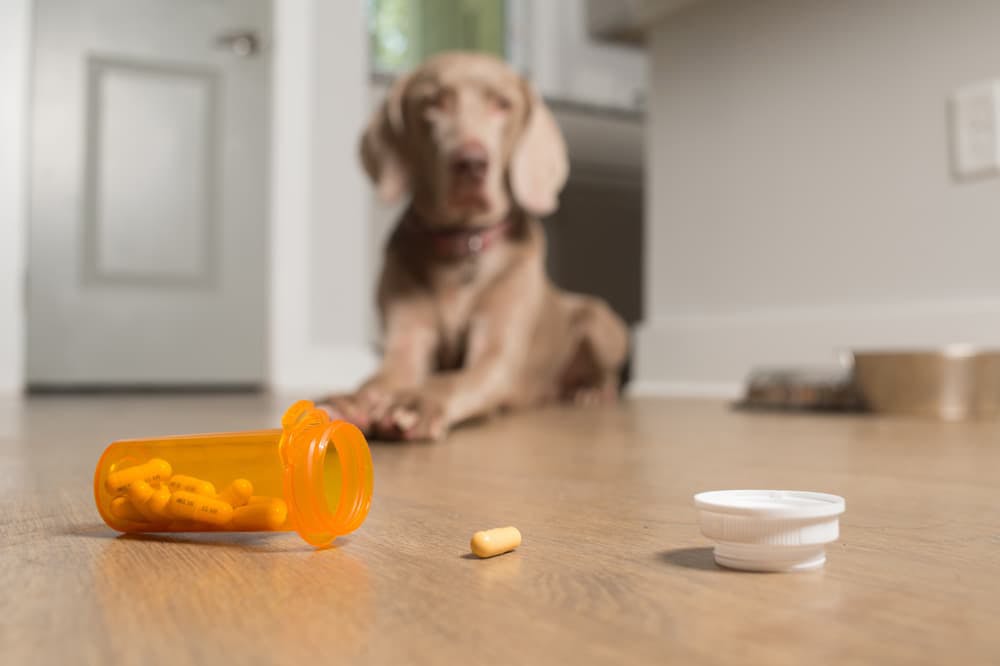Jul 26, 2022
A Guide To Fluconazole For Dogs

Fluconazole (Diflucan) is a medication commonly prescribed to prevent and treat several fungal and yeast infections in humans.
While it's not currently FDA-approved for animals, it can be used by pet owners on their four-legged family members when prescribed by a veterinarian.
What do pet owners need to know about this medication? We put together this guide on the uses, proper dosage, and side effects of fluconazole for dogs.
Always consult your vet first before starting your animals on any new medications.
Find the lowest prices for Fluconazole and get free coupons to use at your local pharmacies with CareCard. No insurance or sign-up is required.
What is fluconazole for dogs?
Fluconazole is an antifungal drug used in the treatment of infections in dogs.
What does fluconazole treat in dogs?
Veterinarians often prescribe fluconazole to treat a variety of fungal infections, such as:
skin infections; yeast and ringworm
fungus in the nailbed
What are the side effects of fluconazole in dogs?
There are common side effects in dogs taking fluconazole as with any medication. These side effects may include:
fatigue/lethargic
decreased appetite
excessive thirst/drinking
increased urination
vomiting
softer stools
diarrhea
weakness
liver toxicity
There is a slight chance that a dog could be allergic to fluconazole. Notify your vet immediately if your dog shows signs of an allergy, including:
anaphylactic shock (cold legs, vomiting, pale gums, collapse, extreme sleepiness, hyperventilation, muscle weakness, respiratory failure, weak pulse)
diarrhea
hives
intense scratching
licking and biting fur and skin
red rash anywhere on the body
runny nose
shaking their head
Call your veterinarian right away if your dog's side effects get worse or are cause for concern (i.e., showing signs of pain)
Contradicitions with fluconazole
Many tolerate this medication with very mild side effects—however, dogs with pre-existing liver or kidney issues can develop serious reactions.
Pregnant or lactating animals shouldn't be given fluconazole, as there isn't much known about the effects it may have on developing puppies.
Consult your veterinarian before starting fluconazole, as it may interact with other medications for blood pressure, anti-acids, pain, blood thinners, anti-depressants, etc.
What is the correct dosage of fluconazole for dogs?
Fluconazole for dogs is available in:
50, 100, 150, and 200 mg oral tablets or;
10 mg/ml liquid suspension
An injectable form of fluconazole is also available but primarily used in veterinary hospitals.
Your dog's fluconazole dosage will depend on the type and severity of the infection and their health. Be sure to measure your dog's dose correctly and follow your vet's instructions carefully.
Other FAQ about fluconazole for dogs
What do I do if I miss a dose?
If you miss a dose, give it to your dog as soon as you remember.
However, if it's close to the time for their next dose, skip the missed dose and go back to the regular dosing schedule.
Don't ever give your dog two doses at one time.
Does my dog need to be monitored by the vet while on fluconazole?
Yes! The risk of liver toxicity in dogs increases with prolonged use of fluconazole- even more so for dogs with previous liver and kidney issues. Therefore, your veterinarian will need to monitor your dog's liver enzymes and any side effects.
How does fluconazole work for treating fungal infections in dogs?
Fluconazole stops the growth and spread of fungus organisms.
If fluconazole is not FDA-approved, is it safe to give to my dog?
While it might not be FDA-approved for treating infections in dogs, fluconazole is considered an extra-label drug. As long as it's prescribed by your veterinarian, it is safe to give. (Always consult with your vet about questions or concerns with any medications.)
Should I stop the medication when my dog's symptoms improve?
You should never stop your dog's medications earlier than recommended by your vet, even if your dog's symptoms improve or go away.
During check-ups, your veterinarian will assess symptoms and the infection before changing the treatment length.
Stopping certain medicines too soon, like fluconazole, can cause a relapse of symptoms and future antifungal resistance.
At CareCard, we are passionate about helping make your prescription payments more affordable, saving members up to 85% on prescription drugs and medications. Learn how CareCard can help make your furry friend's medication payments more manageable.
This guide is meant to be informative and should not be used in lieu of professional veterinary advice